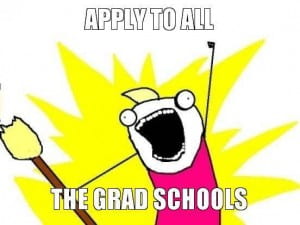On March 22nd, 2017, the Psychology and Human Development Departments put on an event featuring a short talk from both Dr. Martin and Dr. Burns, and a panel discussion with three current students who were accepted to graduate programs. Here are a few things we learned and talked about!

Credit: http://www.briancroxall.net/2015/07/28/keep-calm-and-carry-on-finding-and-building-phd-career-paths/
What is grad school like?
- Masters Programs
- Typically 2 to 3 years
- Depending on the program, you may have to fund your education
- Sometimes, there is funding available through TA or RA positions
- Doctoral Programs
- Typically 4 to 6 years
- Most of the time, you can receive funding for your education through TA or RA positions.
- These programs are highly competitive and harder to get into.
- Fewer classes, which can be intensive, but less structured than undergraduate classes
- As a student, it is your responsibility to organize and prioritize your assignments. There may not be deadlines for assignments, but they need to get done.
How do you decide where to go to graduate school?
- Look for programs that match your goals, research interests, and faculty you see yourself being able to work with.
- Make sure you are willing to live where the graduate school is located. If you know you don’t want to live somewhere, don’t apply to schools in that area.
- Look for numbers of students accepted, internship placement rates, retention rates, licensure of the school, etc. to make an educated choice.
- Grad School Panel Students say: Research the school! It will help you decide, and it will help you if you need to interview for questions, etc.
The Application Process:
- Applications will typically include: a form, transcripts to all institutions (read directions for each school carefully), resume/curriculum vitae, writing sample, GRE/MAT or others, a personal statement, and letters of recommendation.
- More specifically…
- The Personal Statement: usually an essay describing (sometimes there is a prompt) your goals, why you want to go to graduate school/that specific school, and how that school will help you meet your goals.
- Make sure to have others read your personal statement. It is extremely important to double check for spelling or grammatical errors.
- Grad Panel Students say: Write, revise, fix again, edit, and continue. Start your personal statements early! Have Career Services and your advisor read over it and make sure to revise. You will also need to write different personal statements for each school. Most of the time, they ask unique and specific questions.
- The Graduate Record Exam (GRE)
- The GRE is a standardized test, much like the ACT, for graduate admissions.
- Most students will only need to take the GRE, but some may be asked to take the Psychology Subject Test as well.
- There is a fee associated with taking the exam, so plan for that.
- Some schools require different tests, like the Miller Analogies Test (MAT).
- Grad Panel Students say: Plan early! Also, plan financially because the test does cost money, and it can cost money to send scores. You can send up to four scores at the time of the exam, but you will have to pay afterwards to send to more schools. Also, make sure to study!
- Letters of Recommendation
- Most of the time, you will be asked to have between 2 to 3 letters from faculty.
- The people that you ask to write you letters should know you well enough to write you a strong letter.
- The Cost of Applying
- The fees associated with applying to graduate school are usually the application form, the standardized test you may be required to take, getting your official transcripts sent to each school, and if you need to travel for interviews or visits.
- On average, students will spend around $700 on everything. However, some students spend more, and some students spend less.

Credit: https://blog.uvm.edu/afterword/category/people/page/3/
We hope this helps! Good luck on your search for schools and applying! Remember, the faculty in the Psychology and Human Development are always willing to help! They are amazing resources to use, so make sure to ask questions when you have them. Want to learn more? Click the links below!

